
《局外旁觀論》 A Bystander's View Robert Hart The history of essays of westernisation written by Chinese intellectuals in the nineteen century is closely researched by historians and sinologists in different generations. Until now,the landmark work is still S.Teng and J.Fairbank,China's Response to the West:A documentary Survey,1839-1923(Cambridge,MA:Harvard University Press, 1954),1st edition.!China's Response to the West focuses its documentary analyses on a wide range of essays written by Chinese intellectuals from the pre Opium War to the May Fourth Movement.China's Response to the West significantly helps reader to advance their understanding of John Fairbank,Trade and Diplomacy on the China Coast,The Opening of the Treaty Ports,1842-1854 (Cambridge,MA:Harvard University Press,1953),1st edition,2 volumes,2 especially Chapter I,The Problem of China's Response to the West'. From Commissioner Lin Zexu's 1785-1850)moral advice to Queen Victoria to Sun Yat-sen's (adoption of the Russian Party System,the selected sixty-five documents are partially translated in English for researchers who are not familiar with literary Chinese or who intend to introduce some ideas of these essays to the non-Chinese world.Different from translating Chinese books to English,the descriptive account of this eight decades period is simply presented by the translations 1The 1954 edition of China's Response to the West:A documentary Survey.1839-1923 is published with S.Teng and J.Fairbank,Research Guide for China's Response to the West:A documentary Survey, 1839-1923 (Cambridge,MA:Harvard University Press,1954).The latter contains the references, bibliography and glossary of the former.In 1979,the Harvard University Press published the second edition of China's Response to the West,but the 1954 Research Guide is neither published nor combined with the 1979 edition.Hence,the latest edition of China's Response to the West,the 1979 edition,has no references,bibliography and glossary.This has become a serious problem of using this book as the 1954 Research Guide is difficult to find now. 2 The 1953 edition of Trade and Diplomacy is published in two volumes.Similar to the 1954 edition of China's Response to the West,the second volume contains the reference notes,appendices, bibliography and glossary only,but fortunately,the two volumes were combined into one volume in 1964.The 1969 Stanford University Press paperback edition is based on the 1964 edition with John Fairbank's 1968 preface and some minor corrections.The 1969 edition is the latest edition. 1
1 《局外旁觀論》 A Bystander’s View Robert Hart The history of essays of westernisation written by Chinese intellectuals in the nineteen century is closely researched by historians and sinologists in different generations. Until now, the landmark work is still S. Teng and J. Fairbank, China’s Response to the West: A documentary Survey, 1839-1923 (Cambridge, MA: Harvard University Press, 1954), 1 st edition.1 China’s Response to the West focuses its documentary analyses on a wide range of essays written by Chinese intellectuals from the pre Opium War to the May Fourth Movement. China’s Response to the West significantly helps reader to advance their understanding of John Fairbank, Trade and Diplomacy on the China Coast, The Opening of the Treaty Ports, 1842-1854 (Cambridge, MA: Harvard University Press, 1953), 1 st edition, 2 volumes,2 especially Chapter I, ‘The Problem of China’s Response to the West’. From Commissioner Lin Zexu’s (林則徐 1785-1850) moral advice to Queen Victoria to Sun Yat-sen’s () adoption of the Russian Party System, the selected sixty-five documents are partially translated in English for researchers who are not familiar with literary Chinese or who intend to introduce some ideas of these essays to the non-Chinese world. Different from translating Chinese books to English, the descriptive account of this eight decades period is simply presented by the translations 1 The 1954 edition of China’s Response to the West: A documentary Survey, 1839-1923 is published with S. Teng and J. Fairbank, Research Guide for China’s Response to the West: A documentary Survey, 1839-1923 (Cambridge, MA: Harvard University Press, 1954). The latter contains the references, bibliography and glossary of the former. In 1979, the Harvard University Press published the second edition of China’s Response to the West, but the 1954 Research Guide is neither published nor combined with the 1979 edition. Hence, the latest edition of China’s Response to the West, the 1979 edition, has no references, bibliography and glossary. This has become a serious problem of using this book as the 1954 Research Guide is difficult to find now. 2 The 1953 edition of Trade and Diplomacy is published in two volumes. Similar to the 1954 edition of China’s Response to the West, the second volume contains the reference notes, appendices, bibliography and glossary only, but fortunately, the two volumes were combined into one volume in 1964. The 1969 Stanford University Press paperback edition is based on the 1964 edition with John Fairbank’s 1968 preface and some minor corrections. The 1969 edition is the latest edition
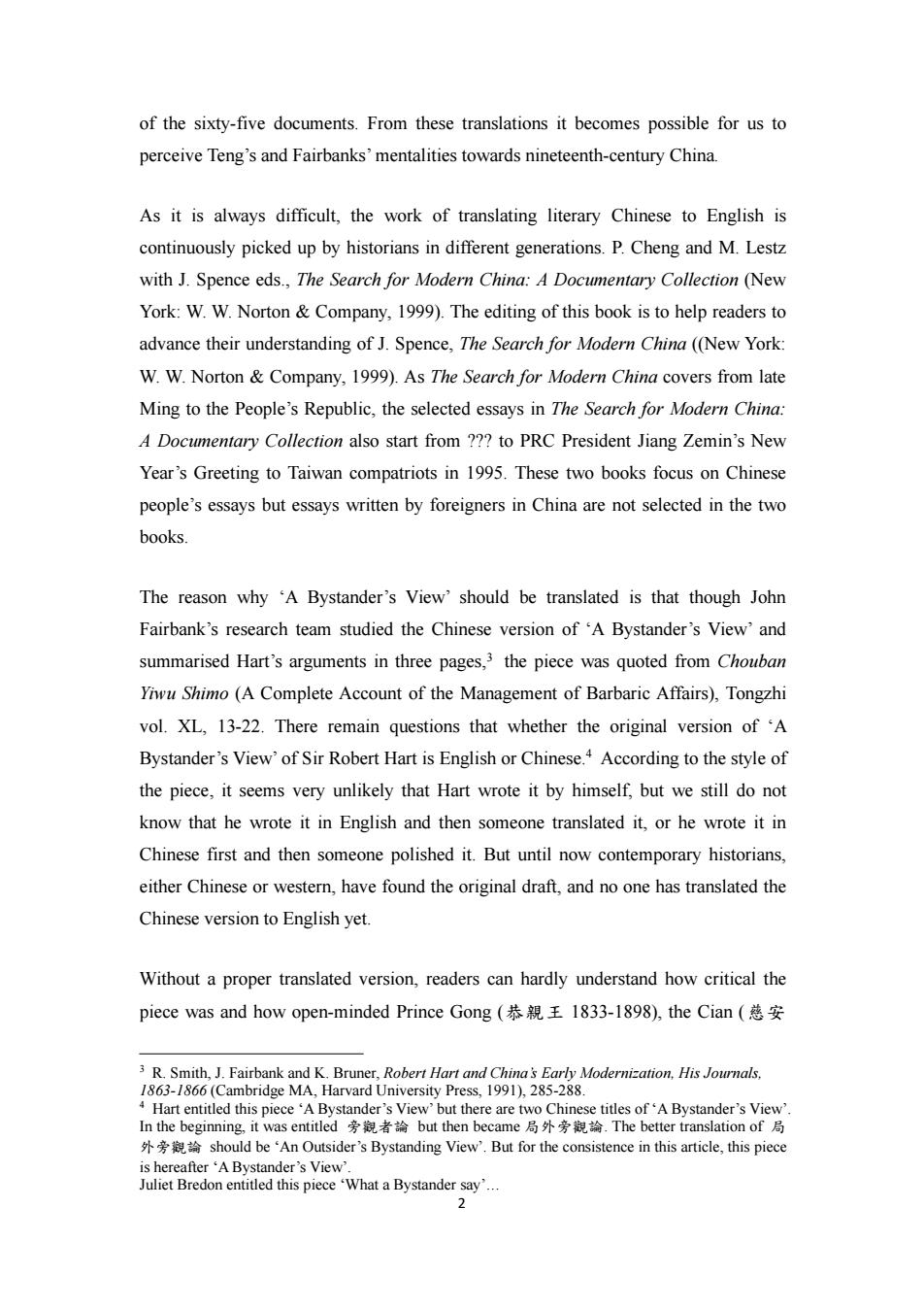
of the sixty-five documents.From these translations it becomes possible for us to perceive Teng's and Fairbanks'mentalities towards nineteenth-century China. As it is always difficult,the work of translating literary Chinese to English is continuously picked up by historians in different generations.P.Cheng and M.Lestz with J.Spence eds.,The Search for Modern China:A Documentary Collection (New York:W.W.Norton Company,1999).The editing of this book is to help readers to advance their understanding of J.Spence,The Search for Modern China ((New York: W.W.Norton Company,1999).As The Search for Modern China covers from late Ming to the People's Republic,the selected essays in The Search for Modern China: A Documentary Collection also start from ??to PRC President Jiang Zemin's New Year's Greeting to Taiwan compatriots in 1995.These two books focus on Chinese people's essays but essays written by foreigners in China are not selected in the two books. The reason why 'A Bystander's View'should be translated is that though John Fairbank's research team studied the Chinese version of 'A Bystander's View'and summarised Hart's arguments in three pages,3 the piece was quoted from Chouban Yiwu Shimo (A Complete Account of the Management of Barbaric Affairs),Tongzhi vol.XL,13-22.There remain questions that whether the original version of 'A Bystander's View'of Sir Robert Hart is English or Chinese.According to the style of the piece,it seems very unlikely that Hart wrote it by himself,but we still do not know that he wrote it in English and then someone translated it,or he wrote it in Chinese first and then someone polished it.But until now contemporary historians, either Chinese or western,have found the original draft,and no one has translated the Chinese version to English yet. Without a proper translated version,readers can hardly understand how critical the piece was and how open-minded Prince Gong(恭親王l833-l898),the Cian(慈安 3 R.Smith,J.Fairbank and K.Bruner,Robert Hart and China's Early Modernization,His Journals, 1863-1866(Cambridge MA.Harvard University Press,1991),285-288. 4 Hart entitled this piece'A Bystander's View'but there are two Chinese titles of'A Bystander's View' In the beginning,it was entitled旁親者論but then became局外旁親論.The better translation of局 should be 'An Outsider's Bystanding View'.But for the consistence in this article,this piece is hereafter 'A Bystander's View'. Juliet Bredon entitled this piece 'What a Bystander say'... 2
2 of the sixty-five documents. From these translations it becomes possible for us to perceive Teng’s and Fairbanks’ mentalities towards nineteenth-century China. As it is always difficult, the work of translating literary Chinese to English is continuously picked up by historians in different generations. P. Cheng and M. Lestz with J. Spence eds., The Search for Modern China: A Documentary Collection (New York: W. W. Norton & Company, 1999). The editing of this book is to help readers to advance their understanding of J. Spence, The Search for Modern China ((New York: W. W. Norton & Company, 1999). As The Search for Modern China covers from late Ming to the People’s Republic, the selected essays in The Search for Modern China: A Documentary Collection also start from ??? to PRC President Jiang Zemin’s New Year’s Greeting to Taiwan compatriots in 1995. These two books focus on Chinese people’s essays but essays written by foreigners in China are not selected in the two books. The reason why ‘A Bystander’s View’ should be translated is that though John Fairbank’s research team studied the Chinese version of ‘A Bystander’s View’ and summarised Hart’s arguments in three pages,3 the piece was quoted from Chouban Yiwu Shimo (A Complete Account of the Management of Barbaric Affairs), Tongzhi vol. XL, 13-22. There remain questions that whether the original version of ‘A Bystander’s View’ of Sir Robert Hart is English or Chinese.4 According to the style of the piece, it seems very unlikely that Hart wrote it by himself, but we still do not know that he wrote it in English and then someone translated it, or he wrote it in Chinese first and then someone polished it. But until now contemporary historians, either Chinese or western, have found the original draft, and no one has translated the Chinese version to English yet. Without a proper translated version, readers can hardly understand how critical the piece was and how open-minded Prince Gong (恭親王 1833-1898), the Cian (慈安 3 R. Smith, J. Fairbank and K. Bruner, Robert Hart and China’s Early Modernization, His Journals, 1863-1866 (Cambridge MA, Harvard University Press, 1991), 285-288. 4 Hart entitled this piece ‘A Bystander’s View’ but there are two Chinese titles of ‘A Bystander’s View’. In the beginning, it was entitled 旁觀者論 but then became 局外旁觀論. The better translation of 局 外旁觀論 should be ‘An Outsider’s Bystanding View’. But for the consistence in this article, this piece is hereafter ‘A Bystander’s View’. Juliet Bredon entitled this piece ‘What a Bystander say’…
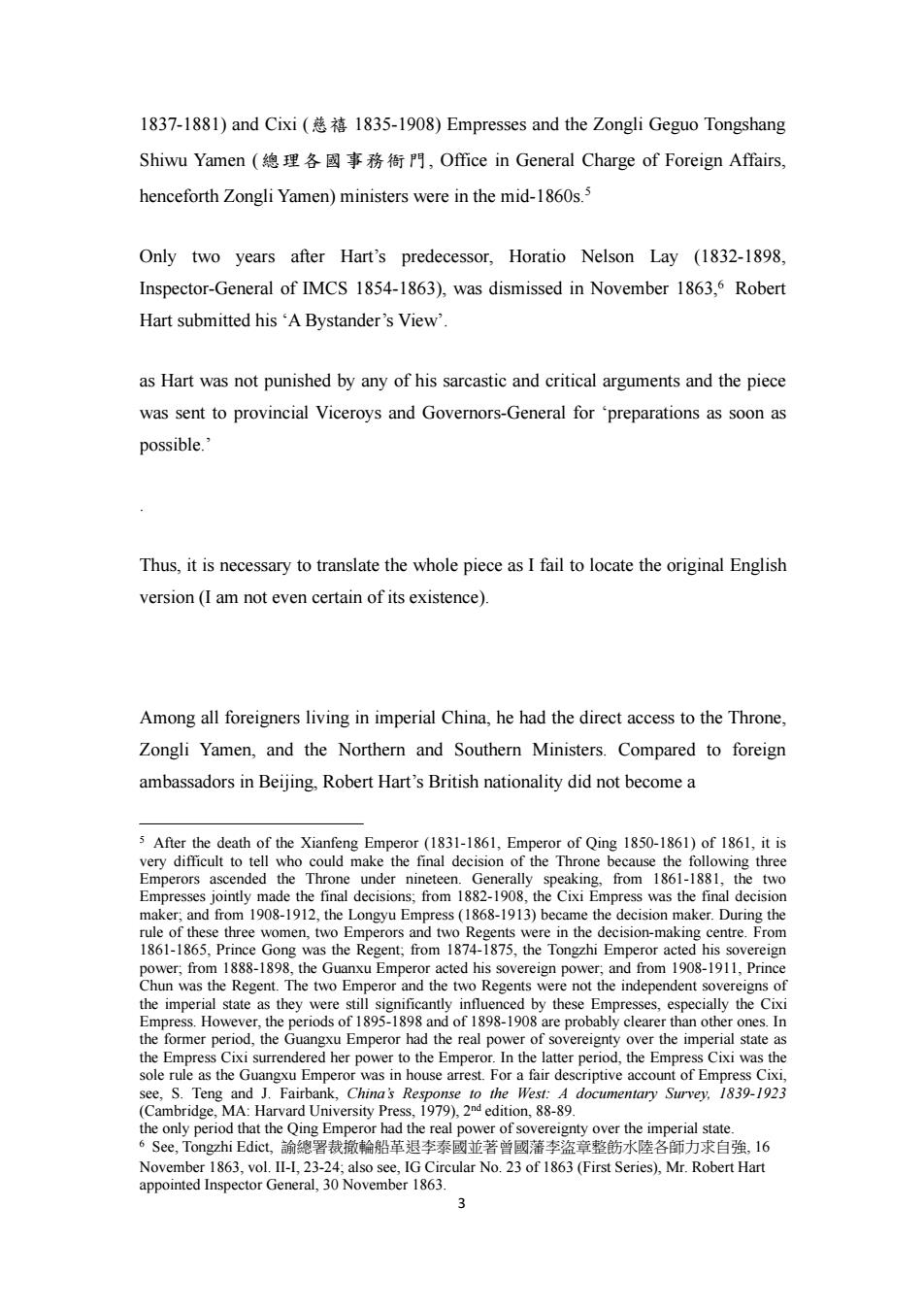
1837-1881)and Cixi 1835-1908)Empresses and the Zongli Geguo Tongshang Shiwu Yamen(總理各國事務衙門,Office in General Charge of Foreign Affairs, henceforth Zongli Yamen)ministers were in the mid-1860s.5 Only two years after Hart's predecessor,Horatio Nelson Lay (1832-1898, Inspector-General of IMCS 1854-1863),was dismissed in November 1863,6 Robert Hart submitted his'A Bystander's View'. as Hart was not punished by any of his sarcastic and critical arguments and the piece was sent to provincial Viceroys and Governors-General for preparations as soon as possible.’ Thus,it is necessary to translate the whole piece as I fail to locate the original English version (I am not even certain of its existence). Among all foreigners living in imperial China,he had the direct access to the Throne, Zongli Yamen,and the Northern and Southern Ministers.Compared to foreign ambassadors in Beijing,Robert Hart's British nationality did not become a 5 After the death of the Xianfeng Emperor(1831-1861,Emperor of Qing 1850-1861)of 1861,it is very difficult to tell who could make the final decision of the Throne because the following three Emperors ascended the Throne under nineteen.Generally speaking,from 1861-1881,the two Empresses jointly made the final decisions;from 1882-1908,the Cixi Empress was the final decision maker;and from 1908-1912,the Longyu Empress(1868-1913)became the decision maker.During the rule of these three women,two Emperors and two Regents were in the decision-making centre.From 1861-1865,Prince Gong was the Regent;from 1874-1875,the Tongzhi Emperor acted his sovereign power;from 1888-1898,the Guanxu Emperor acted his sovereign power;and from 1908-1911,Prince Chun was the Regent.The two Emperor and the two Regents were not the independent sovereigns of the imperial state as they were still significantly influenced by these Empresses,especially the Cixi Empress.However,the periods of 1895-1898 and of 1898-1908 are probably clearer than other ones.In the former period,the Guangxu Emperor had the real power of sovereignty over the imperial state as the Empress Cixi surrendered her power to the Emperor.In the latter period,the Empress Cixi was the sole rule as the Guangxu Emperor was in house arrest.For a fair descriptive account of Empress Cixi, see,S.Teng and J.Fairbank,China's Response to the West:A documentary Survey.1839-1923 (Cambridge,MA:Harvard University Press,1979),2nd edition,88-89. the only period that the Qing Emperor had the real power of sovereignty over the imperial state. 6See,Tongzhi Edict,.諭總署裁撤輪船革退李泰國並著曾國藩李盗章整飭水陸各師力求自強,l6 November 1863,vol.II-I,23-24;also see,IG Circular No.23 of 1863(First Series),Mr.Robert Hart appointed Inspector General,30 November 1863. 3
3 1837-1881) and Cixi (慈禧 1835-1908) Empresses and the Zongli Geguo Tongshang Shiwu Yamen (總理各國事務衙門, Office in General Charge of Foreign Affairs, henceforth Zongli Yamen) ministers were in the mid-1860s.5 Only two years after Hart’s predecessor, Horatio Nelson Lay (1832-1898, Inspector-General of IMCS 1854-1863), was dismissed in November 1863,6 Robert Hart submitted his ‘A Bystander’s View’. as Hart was not punished by any of his sarcastic and critical arguments and the piece was sent to provincial Viceroys and Governors-General for ‘preparations as soon as possible.’ .Thus, it is necessary to translate the whole piece as I fail to locate the original English version (I am not even certain of its existence). Among all foreigners living in imperial China, he had the direct access to the Throne, Zongli Yamen, and the Northern and Southern Ministers. Compared to foreign ambassadors in Beijing, Robert Hart’s British nationality did not become a 5 After the death of the Xianfeng Emperor (1831-1861, Emperor of Qing 1850-1861) of 1861, it is very difficult to tell who could make the final decision of the Throne because the following three Emperors ascended the Throne under nineteen. Generally speaking, from 1861-1881, the two Empresses jointly made the final decisions; from 1882-1908, the Cixi Empress was the final decision maker; and from 1908-1912, the Longyu Empress (1868-1913) became the decision maker. During the rule of these three women, two Emperors and two Regents were in the decision-making centre. From 1861-1865, Prince Gong was the Regent; from 1874-1875, the Tongzhi Emperor acted his sovereign power; from 1888-1898, the Guanxu Emperor acted his sovereign power; and from 1908-1911, Prince Chun was the Regent. The two Emperor and the two Regents were not the independent sovereigns of the imperial state as they were still significantly influenced by these Empresses, especially the Cixi Empress. However, the periods of 1895-1898 and of 1898-1908 are probably clearer than other ones. In the former period, the Guangxu Emperor had the real power of sovereignty over the imperial state as the Empress Cixi surrendered her power to the Emperor. In the latter period, the Empress Cixi was the sole rule as the Guangxu Emperor was in house arrest. For a fair descriptive account of Empress Cixi, see, S. Teng and J. Fairbank, China’s Response to the West: A documentary Survey, 1839-1923 (Cambridge, MA: Harvard University Press, 1979), 2 nd edition, 88-89. the only period that the Qing Emperor had the real power of sovereignty over the imperial state. 6 See, Tongzhi Edict, 諭總署裁撤輪船革退李泰國並著曾國藩李盜章整飭水陸各師力求自強, 16 November 1863, vol. II-I, 23-24; also see, IG Circular No. 23 of 1863 (First Series), Mr. Robert Hart appointed Inspector General, 30 November 1863
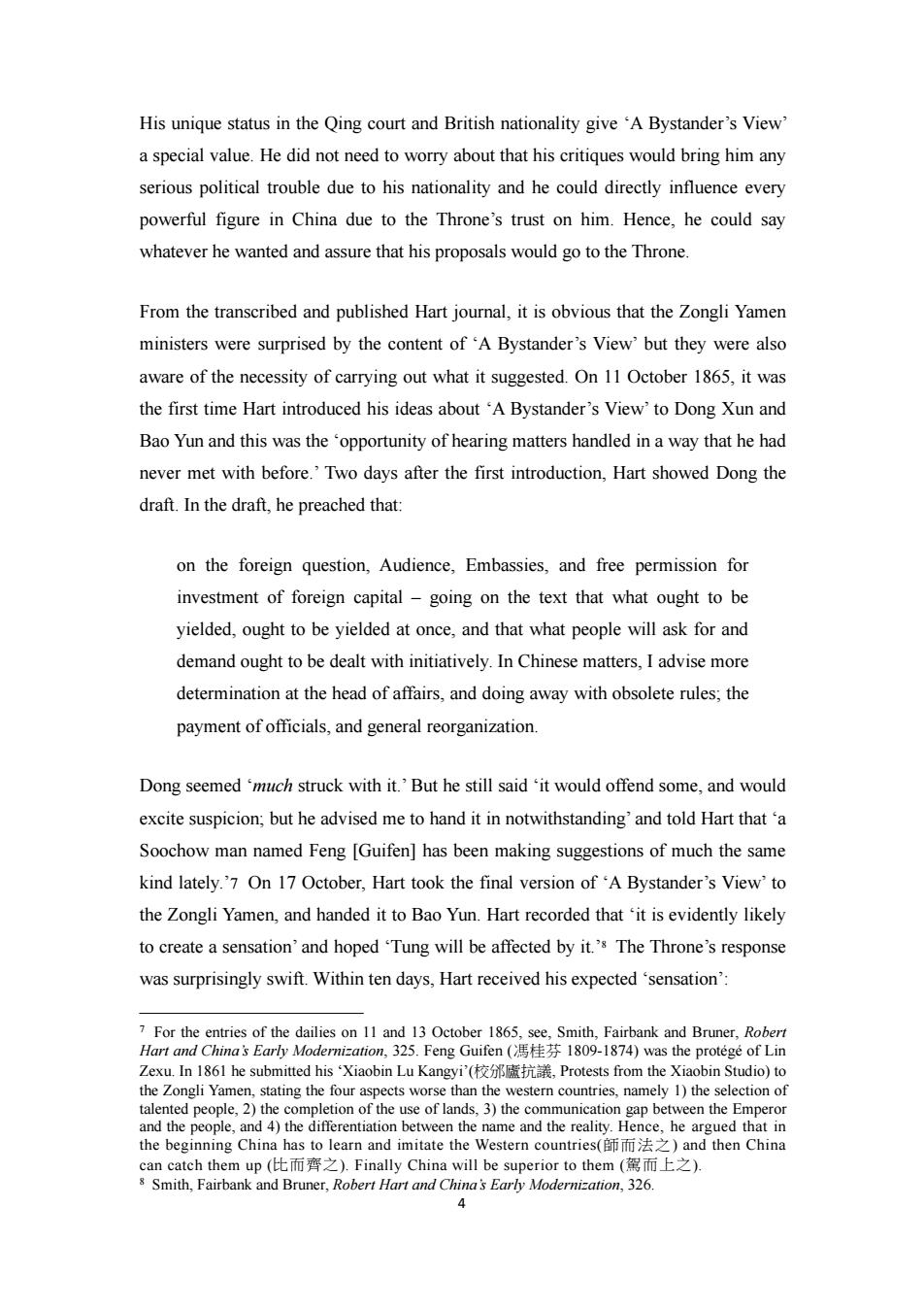
His unique status in the Qing court and British nationality give'A Bystander's View' a special value.He did not need to worry about that his critiques would bring him any serious political trouble due to his nationality and he could directly influence every powerful figure in China due to the Throne's trust on him.Hence,he could say whatever he wanted and assure that his proposals would go to the Throne. From the transcribed and published Hart journal,it is obvious that the Zongli Yamen ministers were surprised by the content of 'A Bystander's View'but they were also aware of the necessity of carrying out what it suggested.On 11 October 1865,it was the first time Hart introduced his ideas about 'A Bystander's View'to Dong Xun and Bao Yun and this was the'opportunity of hearing matters handled in a way that he had never met with before.'Two days after the first introduction,Hart showed Dong the draft.In the draft,he preached that: on the foreign question,Audience,Embassies,and free permission for investment of foreign capital-going on the text that what ought to be yielded,ought to be yielded at once,and that what people will ask for and demand ought to be dealt with initiatively.In Chinese matters,I advise more determination at the head of affairs,and doing away with obsolete rules;the payment of officials,and general reorganization. Dong seemed 'much struck with it.'But he still said 'it would offend some,and would excite suspicion;but he advised me to hand it in notwithstanding'and told Hart that a Soochow man named Feng [Guifen]has been making suggestions of much the same kind lately.'7 On 17 October,Hart took the final version of 'A Bystander's View'to the Zongli Yamen,and handed it to Bao Yun.Hart recorded that 'it is evidently likely to create a sensation'and hoped 'Tung will be affected by it.'s The Throne's response was surprisingly swift.Within ten days,Hart received his expected sensation': 7 For the entries of the dailies on 11 and 13 October 1865,see,Smith,Fairbank and Bruner,Robert Hart and China's Early Modernization,325.Feng Guifen 1809-1874)was the protege of Lin Zexu.nl86 I he submitted his Xiaobin Lu Kangyi'(校邠廬抗議,Protests from the Xiaobin Studio)to the Zongli Yamen,stating the four aspects worse than the western countries,namely 1)the selection of talented people,2)the completion of the use of lands,3)the communication gap between the Emperor and the people,and 4)the differentiation between the name and the reality.Hence,he argued that in the beginning China has to learn and imitate the Western countries(師而法之)and then China can catch them up(t而齊之).Finally China will be superior to them(駕而上之). 8 Smith,Fairbank and Bruner,Robert Hart and China's Early Modernization,326. 4
4 His unique status in the Qing court and British nationality give ‘A Bystander’s View’ a special value. He did not need to worry about that his critiques would bring him any serious political trouble due to his nationality and he could directly influence every powerful figure in China due to the Throne’s trust on him. Hence, he could say whatever he wanted and assure that his proposals would go to the Throne. From the transcribed and published Hart journal, it is obvious that the Zongli Yamen ministers were surprised by the content of ‘A Bystander’s View’ but they were also aware of the necessity of carrying out what it suggested. On 11 October 1865, it was the first time Hart introduced his ideas about ‘A Bystander’s View’ to Dong Xun and Bao Yun and this was the ‘opportunity of hearing matters handled in a way that he had never met with before.’ Two days after the first introduction, Hart showed Dong the draft. In the draft, he preached that: on the foreign question, Audience, Embassies, and free permission for investment of foreign capital – going on the text that what ought to be yielded, ought to be yielded at once, and that what people will ask for and demand ought to be dealt with initiatively. In Chinese matters, I advise more determination at the head of affairs, and doing away with obsolete rules; the payment of officials, and general reorganization. Dong seemed ‘much struck with it.’ But he still said ‘it would offend some, and would excite suspicion; but he advised me to hand it in notwithstanding’ and told Hart that ‘a Soochow man named Feng [Guifen] has been making suggestions of much the same kind lately.’7 On 17 October, Hart took the final version of ‘A Bystander’s View’ to the Zongli Yamen, and handed it to Bao Yun. Hart recorded that ‘it is evidently likely to create a sensation’ and hoped ‘Tung will be affected by it.’ 8 The Throne’s response was surprisingly swift. Within ten days, Hart received his expected ‘sensation’: 7 For the entries of the dailies on 11 and 13 October 1865, see, Smith, Fairbank and Bruner, Robert Hart and China’s Early Modernization, 325. Feng Guifen (馮桂芬 1809-1874) was the protégé of Lin Zexu. In 1861 he submitted his ‘Xiaobin Lu Kangyi’(校邠廬抗議, Protests from the Xiaobin Studio) to the Zongli Yamen, stating the four aspects worse than the western countries, namely 1) the selection of talented people, 2) the completion of the use of lands, 3) the communication gap between the Emperor and the people, and 4) the differentiation between the name and the reality. Hence, he argued that in the beginning China has to learn and imitate the Western countries(師而法之) and then China can catch them up (比而齊之). Finally China will be superior to them (駕而上之). 8 Smith, Fairbank and Bruner, Robert Hart and China’s Early Modernization, 326
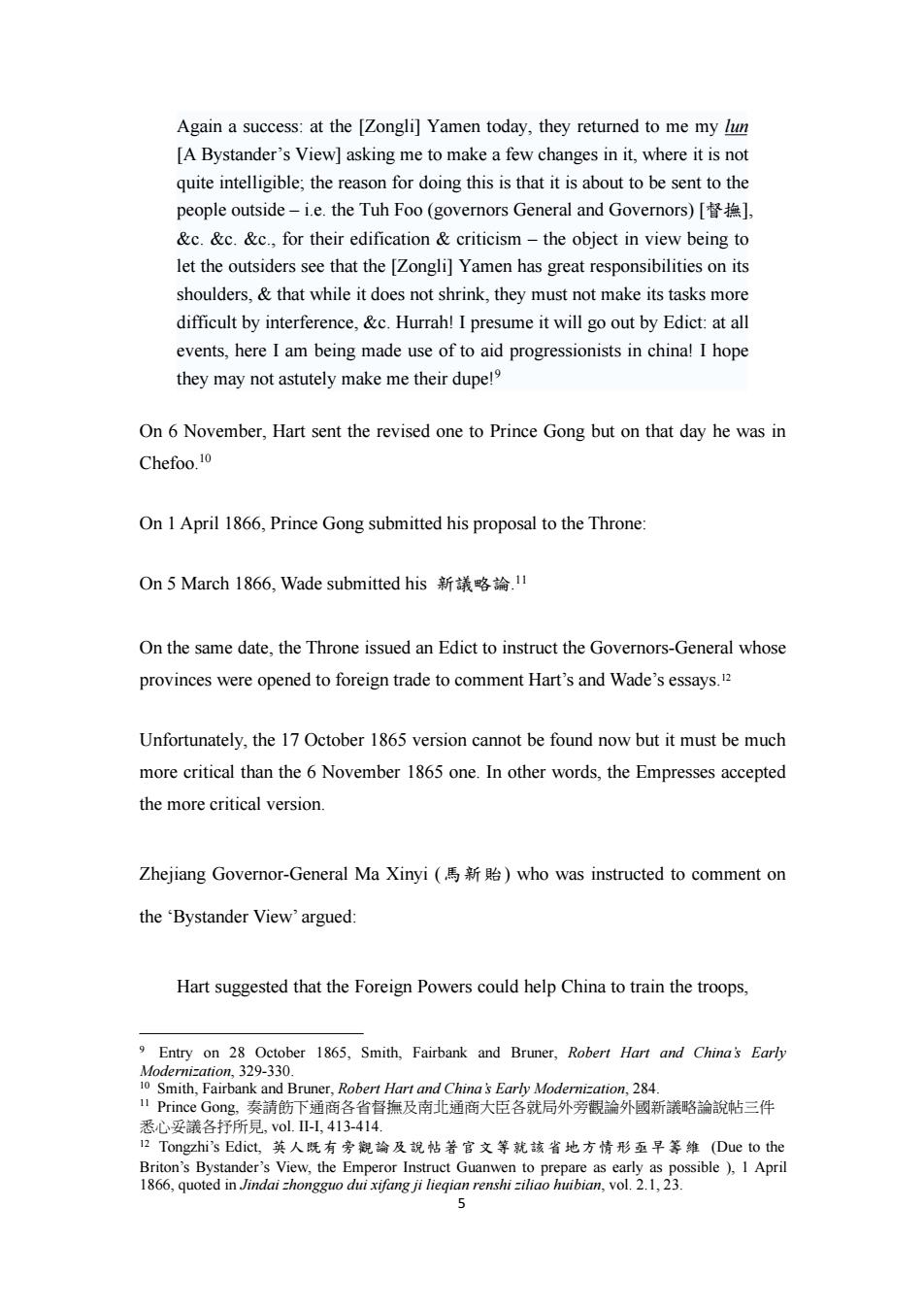
Again a success:at the [Zongli]Yamen today,they returned to me my lun [A Bystander's View]asking me to make a few changes in it,where it is not quite intelligible;the reason for doing this is that it is about to be sent to the people outside-i.e.the Tuh Foo (governors General and Governors)[], &c.&c.&c.,for their edification criticism-the object in view being to let the outsiders see that the [Zongli]Yamen has great responsibilities on its shoulders,that while it does not shrink,they must not make its tasks more difficult by interference,&c.Hurrah!I presume it will go out by Edict:at all events,here I am being made use of to aid progressionists in china!I hope they may not astutely make me their dupe! On 6 November,Hart sent the revised one to Prince Gong but on that day he was in Chefoo.10 On 1 April 1866,Prince Gong submitted his proposal to the Throne: On5 March 1866,Wade submitted his新議略論.il On the same date,the Throne issued an Edict to instruct the Governors-General whose provinces were opened to foreign trade to comment Hart's and Wade's essays.12 Unfortunately,the 17 October 1865 version cannot be found now but it must be much more critical than the 6 November 1865 one.In other words,the Empresses accepted the more critical version. Zhejiang Governor-General Ma Xinyi (who was instructed to comment on the Bystander View'argued: Hart suggested that the Foreign Powers could help China to train the troops, 9 Entry on 28 October 1865,Smith,Fairbank and Bruner,Robert Hart and China's Early Modernization,329-330. 10 Smith,Fairbank and Bruner,Robert Hart and China's Early Modernization,284. ⅡPrince Gong,奏請飭下通商各省督撫及南北通商大臣各就局外旁觀論外國新議略論說帖三件 悉心妥議各抒所見,vol.-L,413-414. I2 Tongzhi's Edict,.英人既有旁親論及說帖著官文等就该省地方情形亟早等维(Due to the Briton's Bystander's View,the Emperor Instruct Guanwen to prepare as early as possible )1 April 1866,quoted in Jindai zhongguo dui xifang ji lieqian renshi ziliao huibian,vol.2.1,23. 5
5 Again a success: at the [Zongli] Yamen today, they returned to me my lun [A Bystander’s View] asking me to make a few changes in it, where it is not quite intelligible; the reason for doing this is that it is about to be sent to the people outside – i.e. the Tuh Foo (governors General and Governors) [督撫], &c. &c. &c., for their edification & criticism – the object in view being to let the outsiders see that the [Zongli] Yamen has great responsibilities on its shoulders, & that while it does not shrink, they must not make its tasks more difficult by interference, &c. Hurrah! I presume it will go out by Edict: at all events, here I am being made use of to aid progressionists in china! I hope they may not astutely make me their dupe! 9 On 6 November, Hart sent the revised one to Prince Gong but on that day he was in Chefoo.10 On 1 April 1866, Prince Gong submitted his proposal to the Throne: On 5 March 1866, Wade submitted his 新議略論.11 On the same date, the Throne issued an Edict to instruct the Governors-General whose provinces were opened to foreign trade to comment Hart’s and Wade’s essays.12 Unfortunately, the 17 October 1865 version cannot be found now but it must be much more critical than the 6 November 1865 one. In other words, the Empresses accepted the more critical version. Zhejiang Governor-General Ma Xinyi (馬新貽) who was instructed to comment on the ‘Bystander View’ argued: Hart suggested that the Foreign Powers could help China to train the troops, 9 Entry on 28 October 1865, Smith, Fairbank and Bruner, Robert Hart and China’s Early Modernization, 329-330. 10 Smith, Fairbank and Bruner, Robert Hart and China’s Early Modernization, 284. 11 Prince Gong, 奏請飭下通商各省督撫及南北通商大臣各就局外旁觀論外國新議略論說帖三件 悉心妥議各抒所見, vol. II-I, 413-414. 12 Tongzhi’s Edict, 英人既有旁觀論及說帖著官文等就該省地方情形亟早籌維 (Due to the Briton’s Bystander’s View, the Emperor Instruct Guanwen to prepare as early as possible ), 1 April 1866, quoted in Jindai zhongguo dui xifang ji lieqian renshi ziliao huibian, vol. 2.1, 23
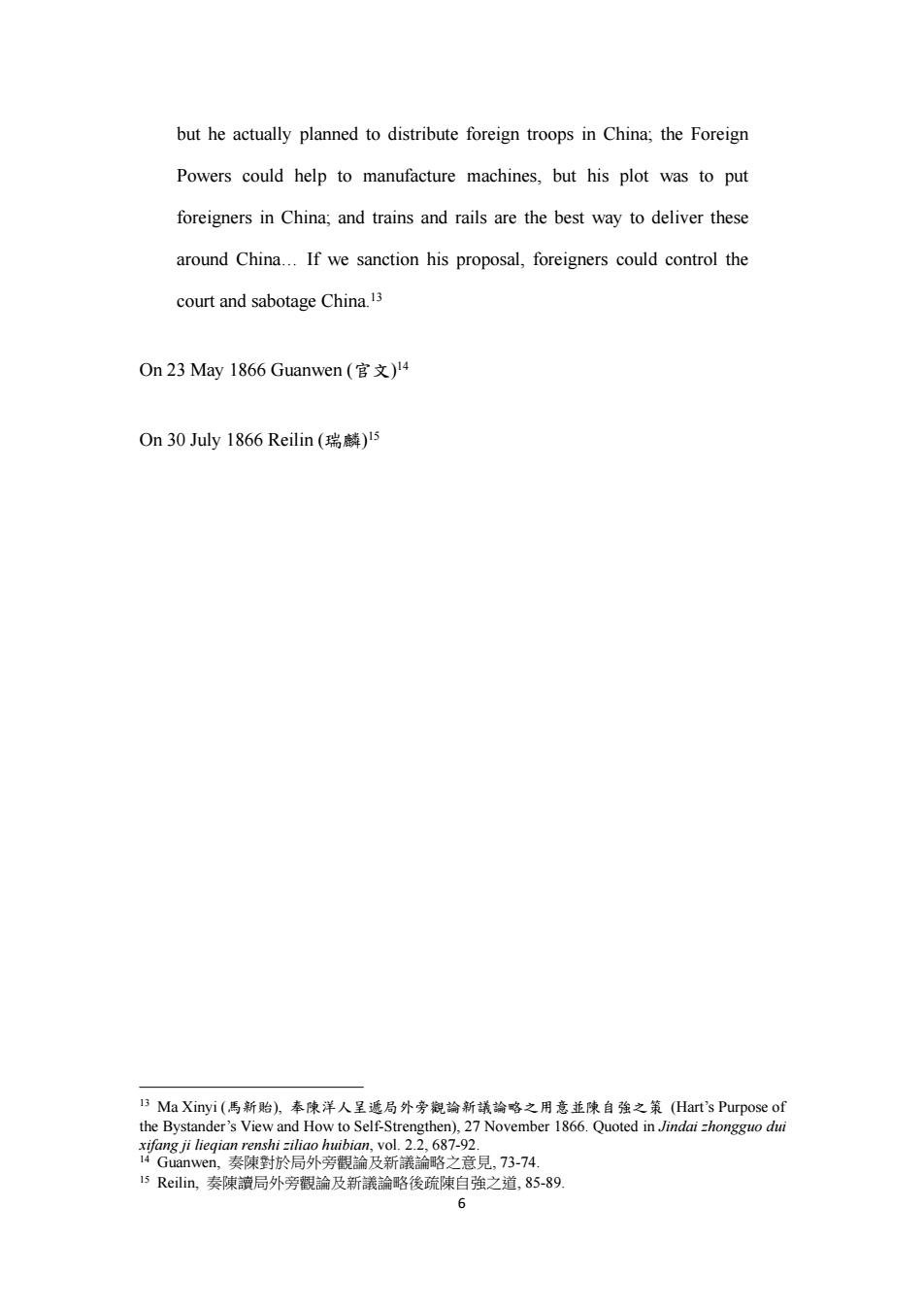
but he actually planned to distribute foreign troops in China;the Foreign Powers could help to manufacture machines,but his plot was to put foreigners in China;and trains and rails are the best way to deliver these around China...If we sanction his proposal,foreigners could control the court and sabotage China.13 On23May1866 Guanwen(官文)14 On30July1866 Reilin(瑞麟)ls 13 Ma Xinyi(馬新貽),奉陳洋人呈遞局外旁親論新議論略之用意並陳自強之策(Hart's Purpose of the Bystander's View and How to Self-Strengthen),27 November 1866.Quoted in Jindai zhongguo dui a美n实皮然2备見.73-74 15 Reilin,奏陳讀局外旁觀論及新議論略後疏陳自強之道,85-89. 6
6 but he actually planned to distribute foreign troops in China; the Foreign Powers could help to manufacture machines, but his plot was to put foreigners in China; and trains and rails are the best way to deliver these around China… If we sanction his proposal, foreigners could control the court and sabotage China.13 On 23 May 1866 Guanwen (官文) 14 On 30 July 1866 Reilin (瑞麟) 15 13 Ma Xinyi (馬新貽), 奉陳洋人呈遞局外旁觀論新議論略之用意並陳自強之策 (Hart’s Purpose of the Bystander’s View and How to Self-Strengthen), 27 November 1866. Quoted in Jindai zhongguo dui xifang ji lieqian renshi ziliao huibian, vol. 2.2, 687-92. 14 Guanwen, 奏陳對於局外旁觀論及新議論略之意見, 73-74. 15 Reilin, 奏陳讀局外旁觀論及新議論略後疏陳自強之道, 85-89
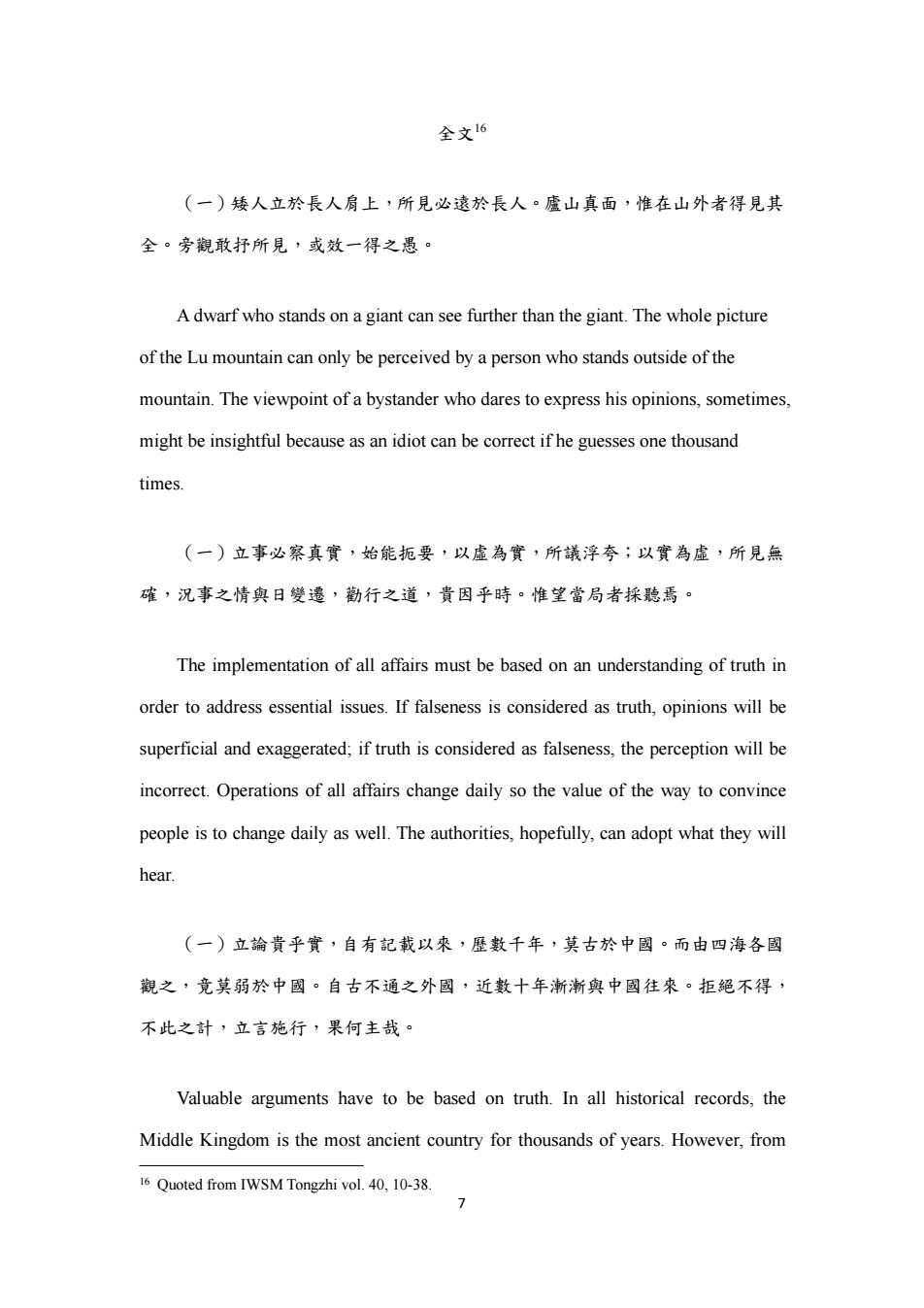
全文16 (一)矮人立於長人肩上’所見必遠於長人。廬山真面,惟在山外者得見其 全。旁觀敢抒所見,或效一得之愚。 A dwarf who stands on a giant can see further than the giant.The whole picture of the Lu mountain can only be perceived by a person who stands outside of the mountain.The viewpoint of a bystander who dares to express his opinions,sometimes, might be insightful because as an idiot can be correct if he guesses one thousand times. (一)立事必察真實·始能扼要·以虛為實,所議浮夸;以實為虛·所見無 確,况事之情與日變遷,勸行之道,貴因乎時。惟望當局者採聽焉。 The implementation of all affairs must be based on an understanding of truth in order to address essential issues.If falseness is considered as truth,opinions will be superficial and exaggerated;if truth is considered as falseness,the perception will be incorrect.Operations of all affairs change daily so the value of the way to convince people is to change daily as well.The authorities,hopefully,can adopt what they will hear. (一)立論貴乎實,自有記载以來·歷數千年,莫古於中國。而由四海各國 觀之·竟莫弱於中國。自古不通之外國·近數十年渐漸與中國往來。拒絕不得, 不此之計”立言施行,果何主哉。 Valuable arguments have to be based on truth.In all historical records,the Middle Kingdom is the most ancient country for thousands of years.However,from 16 Quoted from IWSM Tongzhi vol.40,10-38. 1
7 全文16 (一)矮人立於長人肩上,所見必遠於長人。廬山真面,惟在山外者得見其 全。旁觀敢抒所見,或效一得之愚。 A dwarf who stands on a giant can see further than the giant. The whole picture of the Lu mountain can only be perceived by a person who stands outside of the mountain. The viewpoint of a bystander who dares to express his opinions, sometimes, might be insightful because as an idiot can be correct if he guesses one thousand times.(一)立事必察真實,始能扼要,以虛為實,所議浮夸;以實為虛,所見無 確,況事之情與日變遷,勸行之道,貴因乎時。惟望當局者採聽焉。 The implementation of all affairs must be based on an understanding of truth in order to address essential issues. If falseness is considered as truth, opinions will be superficial and exaggerated; if truth is considered as falseness, the perception will be incorrect. Operations of all affairs change daily so the value of the way to convince people is to change daily as well. The authorities, hopefully, can adopt what they will hear.(一)立論貴乎實,自有記載以來,歷數千年,莫古於中國。而由四海各國 觀之,竟莫弱於中國。自古不通之外國,近數十年漸漸與中國往來。拒絕不得, 不此之計,立言施行,果何主哉。 Valuable arguments have to be based on truth. In all historical records, the Middle Kingdom is the most ancient country for thousands of years. However, from 16 Quoted from IWSM Tongzhi vol. 40, 10-38
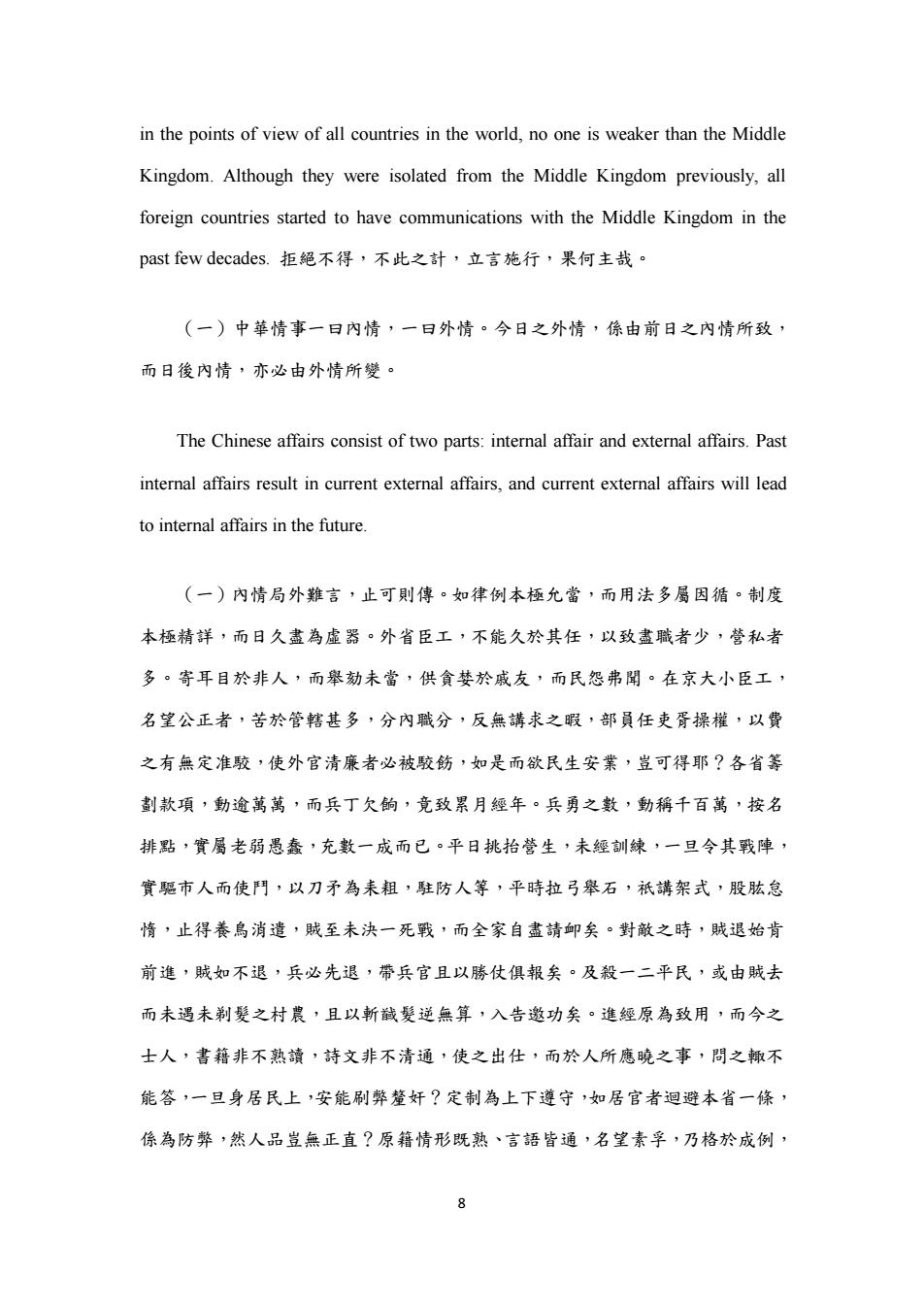
in the points of view of all countries in the world,no one is weaker than the Middle Kingdom.Although they were isolated from the Middle Kingdom previously,all foreign countries started to have communications with the Middle Kingdom in the past few decades.拒絕不得,不此之計,立言施行,果何主哉。 (一)中華情事一日內情,一日外情。今日之外情,係由前日之內情所致, 而日後内情,亦必由外情所變。 The Chinese affairs consist of two parts:internal affair and external affairs.Past internal affairs result in current external affairs,and current external affairs will lead to internal affairs in the future. (一)內情局外難言·止可則傳。如律例本極允當·而用法多屬因循。制度 本極精詳,而日久盡為虚器。外省臣工,不能久於其任,以致盡職者少,营私者 多。寄耳目於非人,而舉劾未當,供貪婪於戚友,而民怨弗聞。在京大小臣工· 名望公正者,苦於管轄甚多,分內職分,反無講求之暇,部員任吏胥操權,以費 之有無定准駮,使外官清廉者必被駮飭·如是而欲民生安業,豈可得耶?各省等 劃款項,動逾萬萬,而兵丁欠的’竟致累月經年。兵勇之數,動稱千百萬’按名 排點,實屬老弱愚蠢’充數一成而已。平日挑抬营生,未經訓練’一旦令其戰陣, 實驅市人而使鬥,以刀矛為耒粗,駐防人等,平時拉弓舉石,祇講架式,股肱怠 惰,止得養烏消遣·賊至未決一死戰,而全家自盡請卹矣。對敵之時,賊退始肯 前進,贼如不退,兵必先退,带兵官且以勝仗俱報矣·及殺一二平民,或由贼去 而未遇未剃髮之村農’且以斬载髮逆無算,入告邀功矣·進經原為致用,而今之 士人·書籍非不熟讀,詩文非不清通’使之出仕·而於人所應曉之事,問之鞭不 能答,一旦身居民上,安能刷弊釐奸?定制為上下遵守,如居官者迴避本省一條, 係為防弊·然人品豈無正直?原籍情形既熟、言語皆通’名望素孚,乃格於成例· 8
8 in the points of view of all countries in the world, no one is weaker than the Middle Kingdom. Although they were isolated from the Middle Kingdom previously, all foreign countries started to have communications with the Middle Kingdom in the past few decades. 拒絕不得,不此之計,立言施行,果何主哉。 (一)中華情事一曰內情,一曰外情。今日之外情,係由前日之內情所致, 而日後內情,亦必由外情所變。 The Chinese affairs consist of two parts: internal affair and external affairs. Past internal affairs result in current external affairs, and current external affairs will lead to internal affairs in the future. (一)內情局外難言,止可則傳。如律例本極允當,而用法多屬因循。制度 本極精詳,而日久盡為虛器。外省臣工,不能久於其任,以致盡職者少,營私者 多。寄耳目於非人,而舉劾未當,供貪婪於戚友,而民怨弗聞。在京大小臣工, 名望公正者,苦於管轄甚多,分內職分,反無講求之暇,部員任吏胥操權,以費 之有無定准駮,使外官清廉者必被駮飭,如是而欲民生安業,豈可得耶?各省籌 劃款項,動逾萬萬,而兵丁欠餉,竟致累月經年。兵勇之數,動稱千百萬,按名 排點,實屬老弱愚蠢,充數一成而已。平日挑抬營生,未經訓練,一旦令其戰陣, 實驅市人而使鬥,以刀矛為耒耝,駐防人等,平時拉弓舉石,祇講架式,股肱怠 惰,止得養鳥消遣,賊至未決一死戰,而全家自盡請卹矣。對敵之時,賊退始肯 前進,賊如不退,兵必先退,帶兵官且以勝仗俱報矣。及殺一二平民,或由賊去 而未遇未剃髮之村農,且以斬馘髮逆無算,入告邀功矣。進經原為致用,而今之 士人,書籍非不熟讀,詩文非不清通,使之出仕,而於人所應曉之事,問之輙不 能答,一旦身居民上,安能刷弊釐奸?定制為上下遵守,如居官者迴避本省一條, 係為防弊,然人品豈無正直?原籍情形既熟、言語皆通,名望素孚,乃格於成例
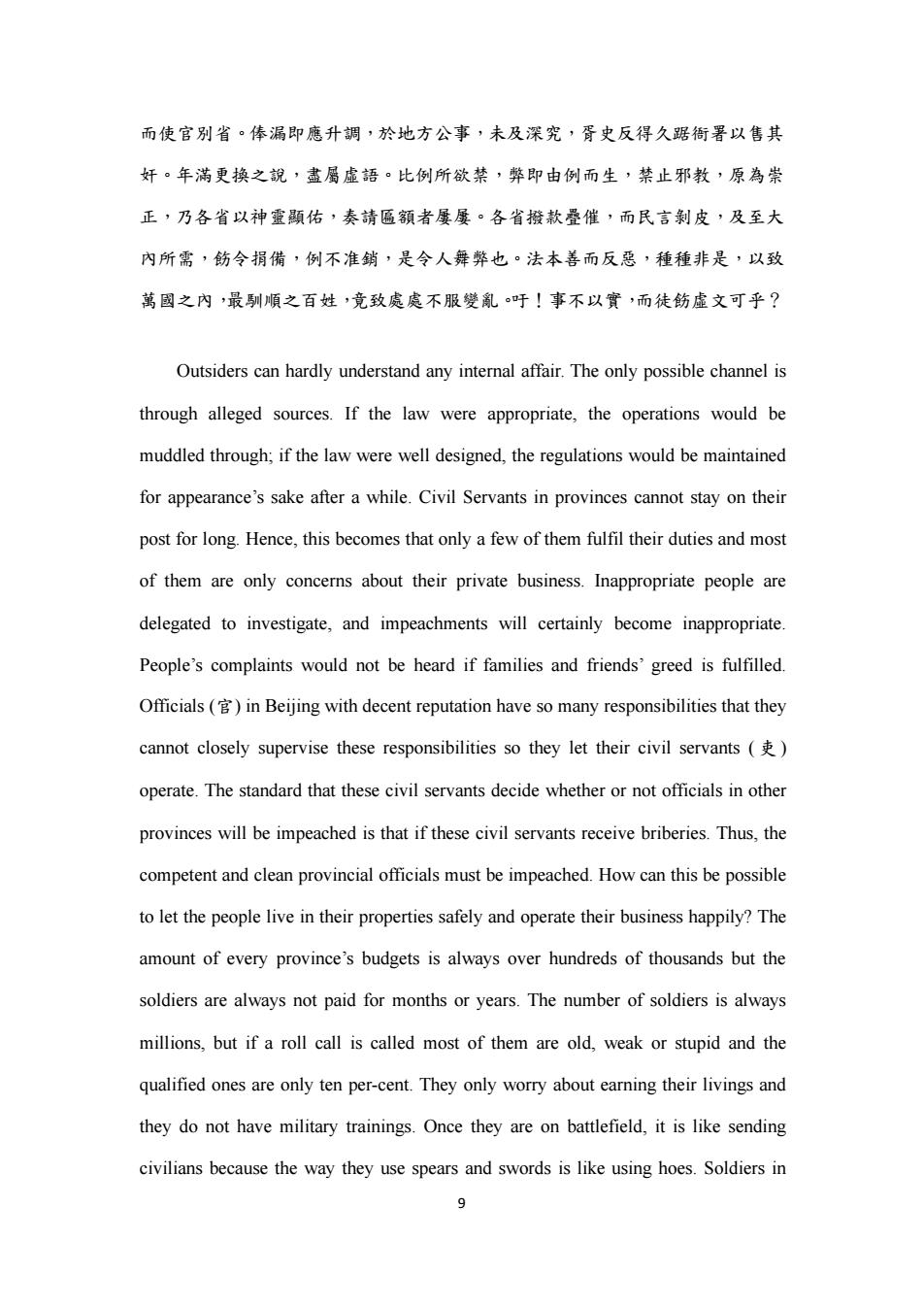
而使官别省·俸漏即應升調,於地方公事,未及深究,胥史反得久踞衙署以售其 奸。年滿更换之說,盡屬虚語。比例所欲禁·弊即由例而生,禁止邪教’原為崇 正,乃各省以神靈顯佑·奏請匾額者屢屢·各省撥款叠催,而民言剝皮,及至大 內内所需,飭令捐備,例不准銷,是令人舞弊也。法本善而反惡,種種非是,以致 萬國之内,最馴順之百姓,竟致處處不服變亂吁!事不以實,而徒飭虚文可乎? Outsiders can hardly understand any internal affair.The only possible channel is through alleged sources.If the law were appropriate,the operations would be muddled through;if the law were well designed,the regulations would be maintained for appearance's sake after a while.Civil Servants in provinces cannot stay on their post for long.Hence,this becomes that only a few of them fulfil their duties and most of them are only concerns about their private business.Inappropriate people are delegated to investigate,and impeachments will certainly become inappropriate People's complaints would not be heard if families and friends'greed is fulfilled. Officials (in Beijing with decent reputation have so many responsibilities that they cannot closely supervise these responsibilities so they let their civil servants ( operate.The standard that these civil servants decide whether or not officials in other provinces will be impeached is that if these civil servants receive briberies.Thus,the competent and clean provincial officials must be impeached.How can this be possible to let the people live in their properties safely and operate their business happily?The amount of every province's budgets is always over hundreds of thousands but the soldiers are always not paid for months or years.The number of soldiers is always millions,but if a roll call is called most of them are old,weak or stupid and the qualified ones are only ten per-cent.They only worry about earning their livings and they do not have military trainings.Once they are on battlefield,it is like sending civilians because the way they use spears and swords is like using hoes.Soldiers in 9
9 而使官別省。俸漏即應升調,於地方公事,未及深究,胥史反得久踞衙署以售其 奸。年滿更換之說,盡屬虛語。比例所欲禁,弊即由例而生,禁止邪教,原為崇 正,乃各省以神靈顯佑,奏請匾額者屢屢。各省撥款疊催,而民言剝皮,及至大 內所需,飭令捐備,例不准銷,是令人舞弊也。法本善而反惡,種種非是,以致 萬國之內,最馴順之百姓,竟致處處不服變亂。吁!事不以實,而徒飭虛文可乎? Outsiders can hardly understand any internal affair. The only possible channel is through alleged sources. If the law were appropriate, the operations would be muddled through; if the law were well designed, the regulations would be maintained for appearance’s sake after a while. Civil Servants in provinces cannot stay on their post for long. Hence, this becomes that only a few of them fulfil their duties and most of them are only concerns about their private business. Inappropriate people are delegated to investigate, and impeachments will certainly become inappropriate. People’s complaints would not be heard if families and friends’ greed is fulfilled. Officials (官) in Beijing with decent reputation have so many responsibilities that they cannot closely supervise these responsibilities so they let their civil servants ( 吏 ) operate. The standard that these civil servants decide whether or not officials in other provinces will be impeached is that if these civil servants receive briberies. Thus, the competent and clean provincial officials must be impeached. How can this be possible to let the people live in their properties safely and operate their business happily? The amount of every province’s budgets is always over hundreds of thousands but the soldiers are always not paid for months or years. The number of soldiers is always millions, but if a roll call is called most of them are old, weak or stupid and the qualified ones are only ten per-cent. They only worry about earning their livings and they do not have military trainings. Once they are on battlefield, it is like sending civilians because the way they use spears and swords is like using hoes. Soldiers in
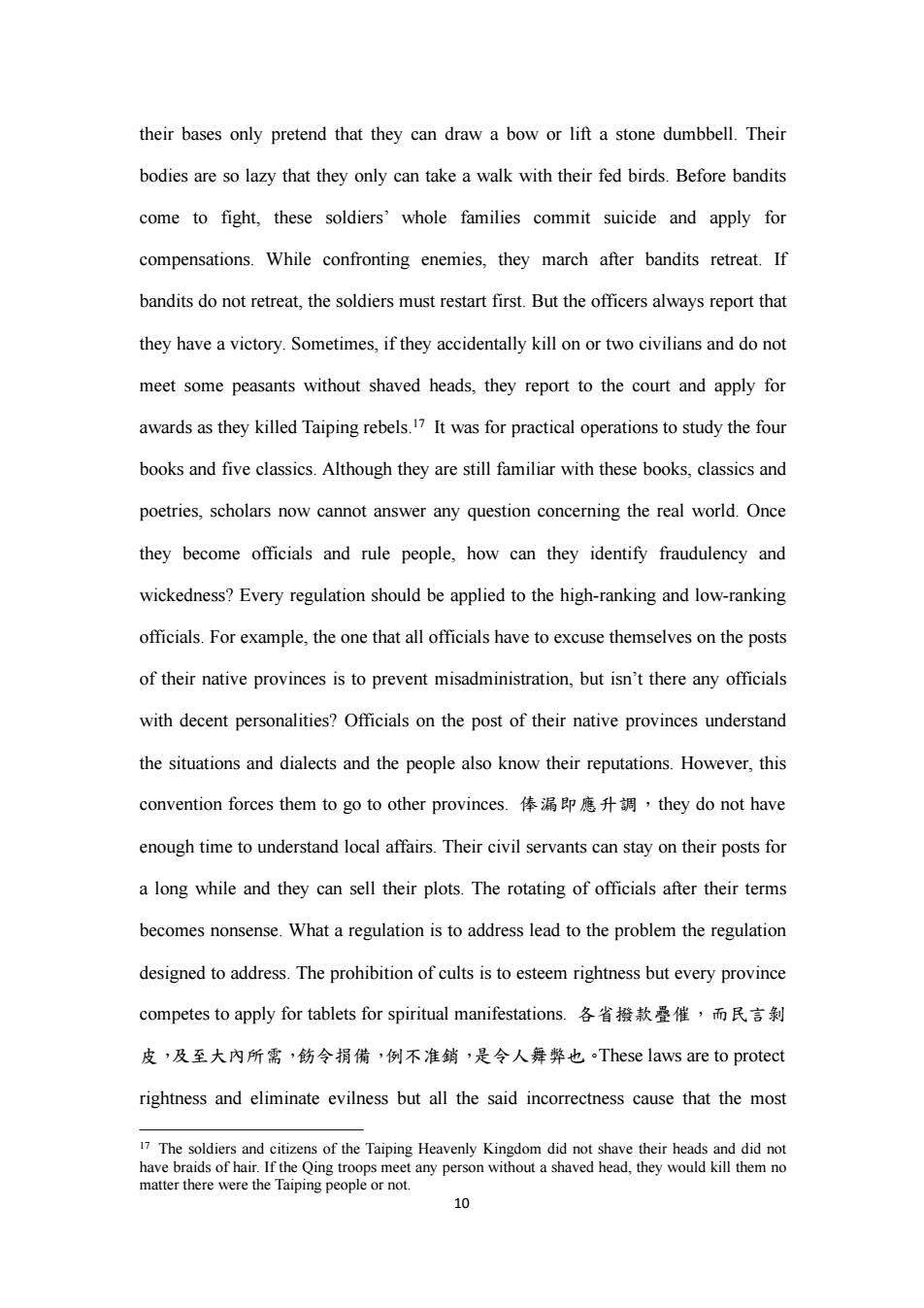
their bases only pretend that they can draw a bow or lift a stone dumbbell.Their bodies are so lazy that they only can take a walk with their fed birds.Before bandits come to fight,these soldiers'whole families commit suicide and apply for compensations.While confronting enemies,they march after bandits retreat.If bandits do not retreat,the soldiers must restart first.But the officers always report that they have a victory.Sometimes,if they accidentally kill on or two civilians and do not meet some peasants without shaved heads,they report to the court and apply for awards as they killed Taiping rebels.17 It was for practical operations to study the four books and five classics.Although they are still familiar with these books,classics and poetries,scholars now cannot answer any question concerning the real world.Once they become officials and rule people,how can they identify fraudulency and wickedness?Every regulation should be applied to the high-ranking and low-ranking officials.For example,the one that all officials have to excuse themselves on the posts of their native provinces is to prevent misadministration,but isn't there any officials with decent personalities?Officials on the post of their native provinces understand the situations and dialects and the people also know their reputations.However,this convention forces them to go to other provinces.俸漏即應升調,they do not have enough time to understand local affairs.Their civil servants can stay on their posts for a long while and they can sell their plots.The rotating of officials after their terms becomes nonsense.What a regulation is to address lead to the problem the regulation designed to address.The prohibition of cults is to esteem rightness but every province competes to apply for tablets for spiritual manifestations.各省撥款叠催,而民言剝 皮,及至大內所需,飭令捐備,例不准销,是令人舞弊也These laws are to protect rightness and eliminate evilness but all the said incorrectness cause that the most 17 The soldiers and citizens of the Taiping Heavenly Kingdom did not shave their heads and did not have braids of hair.If the Qing troops meet any person without a shaved head,they would kill them no matter there were the Taiping people or not. 10
10 their bases only pretend that they can draw a bow or lift a stone dumbbell. Their bodies are so lazy that they only can take a walk with their fed birds. Before bandits come to fight, these soldiers’ whole families commit suicide and apply for compensations. While confronting enemies, they march after bandits retreat. If bandits do not retreat, the soldiers must restart first. But the officers always report that they have a victory. Sometimes, if they accidentally kill on or two civilians and do not meet some peasants without shaved heads, they report to the court and apply for awards as they killed Taiping rebels.17 It was for practical operations to study the four books and five classics. Although they are still familiar with these books, classics and poetries, scholars now cannot answer any question concerning the real world. Once they become officials and rule people, how can they identify fraudulency and wickedness? Every regulation should be applied to the high-ranking and low-ranking officials. For example, the one that all officials have to excuse themselves on the posts of their native provinces is to prevent misadministration, but isn’t there any officials with decent personalities? Officials on the post of their native provinces understand the situations and dialects and the people also know their reputations. However, this convention forces them to go to other provinces. 俸漏即應升調,they do not have enough time to understand local affairs. Their civil servants can stay on their posts for a long while and they can sell their plots. The rotating of officials after their terms becomes nonsense. What a regulation is to address lead to the problem the regulation designed to address. The prohibition of cults is to esteem rightness but every province competes to apply for tablets for spiritual manifestations. 各省撥款疊催,而民言剝 皮,及至大內所需,飭令捐備,例不准銷,是令人舞弊也。These laws are to protect rightness and eliminate evilness but all the said incorrectness cause that the most 17 The soldiers and citizens of the Taiping Heavenly Kingdom did not shave their heads and did not have braids of hair. If the Qing troops meet any person without a shaved head, they would kill them no matter there were the Taiping people or not